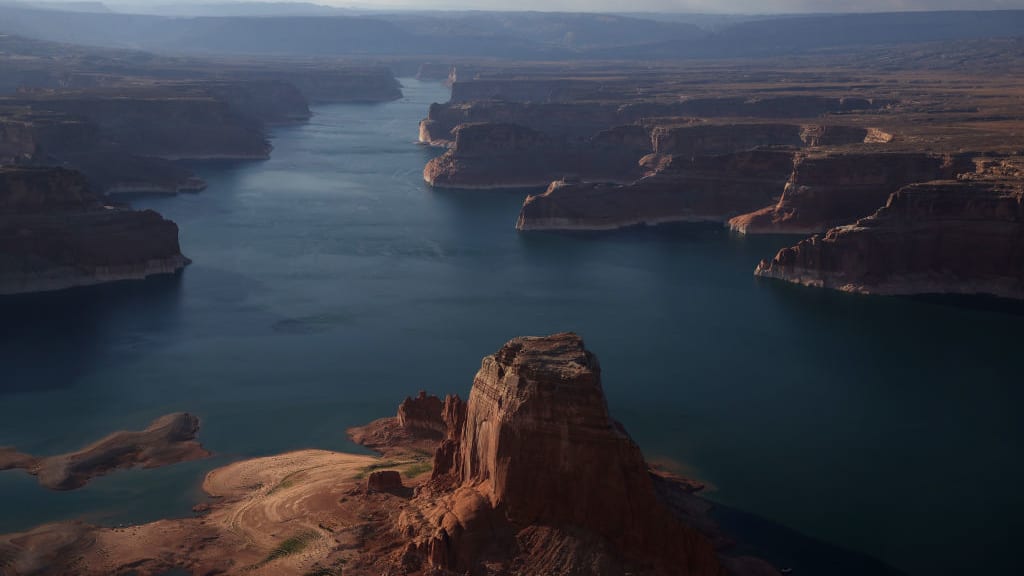Federal officials impose emergency water cuts for Arizona and Nevada


A free daily email with the biggest news stories of the day – and the best features from TheWeek.com
You are now subscribed
Your newsletter sign-up was successful
With water levels at Lake Mead and Lake Powell continuing to drop, the U.S. Bureau of Reclamation announced on Tuesday new water restrictions for Arizona, Nevada, and Mexico.
Two months ago, the seven states that rely on water from the Colorado River — California, Arizona, Nevada, Colorado, Wyoming, New Mexico, and Utah — were tasked with coming up with plans to reduce water use by 2 million to 4 million acre-feet, the Los Angeles Times reports. The talks have been at times contentious, due to the states all having different interests, and an agreement has yet to be reached.
Tanya Trujillo, the Interior Department's assistant secretary for water and science, said on Tuesday that a Tier 2 shortage has been declared for 2023, a first for the Colorado River. This means Arizona's annual water apportionment will be reduced by 21 percent, Nevada's by 8 percent, and Mexico's by 7 percent.
The Week
Escape your echo chamber. Get the facts behind the news, plus analysis from multiple perspectives.

Sign up for The Week's Free Newsletters
From our morning news briefing to a weekly Good News Newsletter, get the best of The Week delivered directly to your inbox.
From our morning news briefing to a weekly Good News Newsletter, get the best of The Week delivered directly to your inbox.
Lake Mead and Lake Powell are the Colorado River's two main reservoirs, and their water levels are at historic lows — both are nearly three-fourths empty, the Times says. The causes include climate change, chronic overuse, and the dry climate, and Trujillo said "in order to avoid a catastrophic collapse of the Colorado River System and a future of uncertainty and conflict, water use in the [Colorado River] Basin must be reduced."
Arizona and Nevada have already gone through one round of water reductions, and lawmakers are calling on other states to do more about the crisis. "Arizona has offered to put more wet water on the table than any other state, where other parties have offered a fraction of the same amount," Sen. Mark Kelly (D-Ariz.) wrote in a letter to Secretary of the Interior Deb Haaland. Read more at the Los Angeles Times.
A free daily email with the biggest news stories of the day – and the best features from TheWeek.com
Catherine Garcia has worked as a senior writer at The Week since 2014. Her writing and reporting have appeared in Entertainment Weekly, The New York Times, Wirecutter, NBC News and "The Book of Jezebel," among others. She's a graduate of the University of Redlands and the Columbia University Graduate School of Journalism.
-
 Why are election experts taking Trump’s midterm threats seriously?
Why are election experts taking Trump’s midterm threats seriously?IN THE SPOTLIGHT As the president muses about polling place deployments and a centralized electoral system aimed at one-party control, lawmakers are taking this administration at its word
-
 ‘Restaurateurs have become millionaires’
‘Restaurateurs have become millionaires’Instant Opinion Opinion, comment and editorials of the day
-
 Earth is rapidly approaching a ‘hothouse’ trajectory of warming
Earth is rapidly approaching a ‘hothouse’ trajectory of warmingThe explainer It may become impossible to fix
-
 Earth is rapidly approaching a ‘hothouse’ trajectory of warming
Earth is rapidly approaching a ‘hothouse’ trajectory of warmingThe explainer It may become impossible to fix
-
 At least 8 dead in California’s deadliest avalanche
At least 8 dead in California’s deadliest avalancheSpeed Read The avalanche near Lake Tahoe was the deadliest in modern California history and the worst in the US since 1981
-
 The plan to wall off the ‘Doomsday’ glacier
The plan to wall off the ‘Doomsday’ glacierUnder the Radar Massive barrier could ‘slow the rate of ice loss’ from Thwaites Glacier, whose total collapse would have devastating consequences
-
 Can the UK take any more rain?
Can the UK take any more rain?Today’s Big Question An Atlantic jet stream is ‘stuck’ over British skies, leading to ‘biblical’ downpours and more than 40 consecutive days of rain in some areas
-
 As temperatures rise, US incomes fall
As temperatures rise, US incomes fallUnder the radar Elevated temperatures are capable of affecting the entire economy
-
 The world is entering an ‘era of water bankruptcy’
The world is entering an ‘era of water bankruptcy’The explainer Water might soon be more valuable than gold
-
 Climate change could lead to a reptile ‘sexpocalypse’
Climate change could lead to a reptile ‘sexpocalypse’Under the radar The gender gap has hit the animal kingdom
-
 The former largest iceberg is turning blue. It’s a bad sign.
The former largest iceberg is turning blue. It’s a bad sign.Under the radar It is quickly melting away
